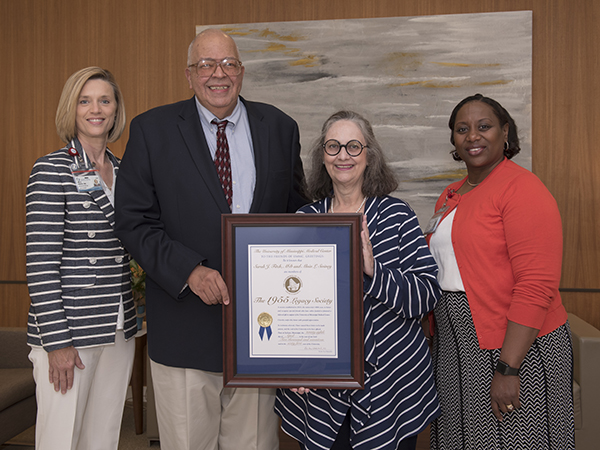Fitch-Swiney gift establishes Schools of Medicine, Nursing scholarship

Inspired by her experience as a medical student at the University of Mississippi Medical Center and what they see as the future of health care, UM School of Medicine alumna Dr. Sarah Fitch and her husband Alvin Swiney have established the Fitch-Swiney School of Medicine and School of Nursing Scholarship Endowment.
Fitch, a pediatric radiologist in Memphis working for the University of Arkansas Children’s Hospital, graduated from Millsaps College before earning her medical degree in 1978. Swiney is a musical instrument technician and acoustician who did undergraduate work at Louisiana State University and completed an apprenticeship with renowned woodwind maker, W. Hans Moennig. Both relied on scholarships and hard work to earn their degrees, making this gift all the more meaningful to them.
“My parents helped as often as they could. They simply weren’t able to help entirely,” said Fitch. “If I had not had scholarship help in association with work study, it would have been impossible for me to go to medical school."
Swiney’s father grew up in a small, rural Southern town, and did not have a formal education due to lack of availability. He constantly emphasized the importance of an education to Swiney and his siblings. Swiney went to LSU on tuition scholarship and arrived with the last $5 his dad had to offer in his pocket. To Swiney, being able to help future students is deeply personal.
“I think about all the children who have the potential to go to college, but yet they don’t have basic needs met such as transportation or even having enough to eat before they get there. I think it’s very important to provide people with monies and scholarships in order to let them rise to their level of potential,” he said.
The annual scholarship will be divided evenly to fund separate full-tuition scholarships for at least one medical student and at least one nursing student each year. Fitch and Swiney want to promote diversity in health care and stipulated that recipients of the scholarship represent diverse racial and ethnic backgrounds.
“I simply wanted to provide some financial aid for young men and women of all races that could go to further their education, and I wanted it to go to an area in which I thought it would be used,” said Fitch.
Fitch believes that area of need lies within nurse practitioners as well as physicians.
“It has become obvious to me over the last several years that the answer to medical care in the coming years is going to be to use additional personnel other than physicians to provide medical care to the population,” she said.
Dr. Kim Hoover, dean of the School of Nursing, agreed: “There is great potential in Mississippi for nurse practitioners to provide care in areas that lack adequate numbers of health care providers and to provide specialized care. The majority of Mississippi nurse practitioners are educated as family nurse practitioners. With their collaborating physicians, they are able to provide primary care to all ages.”
With the rising cost of tuition across the board, scholarships are becoming even more crucial to students of all backgrounds in all disciplines, according to Hoover and Dr. Loretta Jackson-Williams, vice dean for medical education in the School of Medicine.
“Funding for nursing students has been on the decline for several years. Scholarships may be the only assistance that a student receives while he or she is in school,” Hoover added.
Jackson-Williams added, “There are very few options for funding a medical education. Currently, this is primarily done with loans and scholarships.”
She said that loan debt can often lead to students choosing careers based on earning potential instead of their own interests, or instead of staying in state.
“This type of scholarship would relieve this indebtedness burden from the students receiving it and encourage wise career choices that are truly reflective of interest,” Jackson-Williams said.
When Fitch and Swiney began discussing their gift, it was important to them that their gift mean something, and Swiney is a firm believer that this does.
“A degree from this institution would not be a worthless degree or not be a diluted degree. It would be something that has merit and integrity and stands for something. So I can’t think of a better place to help than UMMC,” he said.
Fitch agreed. “I have always known that my education was superb here. I want for other people to be able to help those who need help to be able to get an education here and I hope that many of those students will then practice here.”

